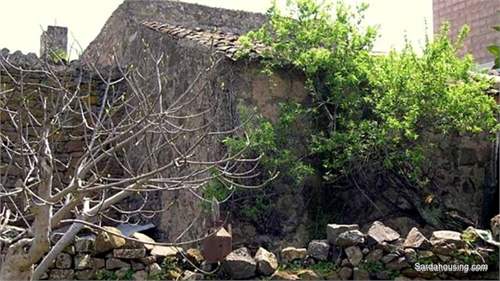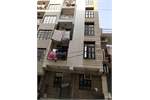
House for sale
£21,885
Sardinia, Olbia-Tempio, Oschiri, Italy Property ID: 41647758
Property description
House Il Mandorlo -
A fascinating challenge, if you love the traditional old materials!
In Oschiri, in province of Olbia-Tempio in Sardinia, House il Mandorlo is a90 sqm semi-detached house on two levels, with a 30 sqm courtyard.
The walls are made of trachyte-stone, and floors of wood.
One side of House Il Mandorlo is in front on the street and has floors and roof in a good state on both floors; roof and floors of the back side of house, on the contrary, are to be restored.
Truss is out of trachyte and the two centyry old fire place is 2 is perfectly working. In the courtyard there is a century old almond tree and a fence in stone.
It is possible to buy more land nearby.
The whole building can be completely restored so to emphasize building materials (trachyte, stone, wood).
Nearby you'll find beautiful examples of unpolluted nature, such as the Lake of Coghinas, or the surrounding wonderful natural area at the feet of Mount Limbara.
Along the SS199 from Olbia to Sassari, Oschiri is 40 km to the sea and 46 km to Olbia. Energy Class G. IPE> 175 kWh/sqm year - data awaiting certification.
Price: euro 25.000.
-
Oschiri short info
Oschiri in the province of Olbia-Tempio is 280 m. above sea level in the valley floor of the Limbara-Lernone in Logudoro, bordering the Gallura. The territory is morphologically quite varied, with heights up to 1,023 m.
In an area of livestock farming and viticulture, Oschiri remains essentially a village of farmers and stockbreeders, with some developing in the food and dairy industry.
Quite recently the discovery of tourist potential of the area, has resulted in a good variety of options for restaurants and accommodation. Noteworthy in the field of gastronomy, besides the bread "carasau" and the genuine pecorino cheese, is the typical dish of the village, "sa panada", i.e. baskets of pasta stuffed with meat and herbs. In late August the "sagra of panada" is organized by the municipality and the producers.
The several archaeological findings around the village are evidence of the human presence in the territory since the Nuragic age. Must-see, if you want to dive into the magical world of our ancestors, is the rocky altar which is located in front of the church of S. Stefano, in a grove north of Oschiri.
The village of Oschiri was founded in the Middle Ages on the ruins of the Roman fortress of Castrum and the medieval village of Oppidum Octi.
Its ancient origins are proved by various Romanesque churches, and some of them, just outside Oschiri, are really worth a visit, such as the Church of St. Demetrius, 1158, and the medieval church of Our Lady of Castro and of Our Lady of Otti, both belonging to disappeared villages.
The centre of the village, an interesting destination for fans of the history of architecture, is characterized by narrow streets, sometimes paved in stone, and large low houses built with local stone. Some buildings still have windows in Gothic-Aragonese style, with elegant monolithic cornices, and carved lintels above the entrance doors.
Nature lovers can not fail to visit two beautiful examples of unspoiled nature: the area of reforestation Su Filigosu and the wild area of the slopes of Mount Limbara.
Visitors of Su Filigosu will discover, on foot or by bike, an area that is inhabited by wildlife typical of the area, rich in various species of mushrooms, and scattered with archaeological remains of prehistoric times (Domus de Janas, Dolmen, Tombs of the Giants and nuraghi), all in a good state and accessible.
Another interesting area is around the river Coghinas, the Thermos of the Romans and the third longest river in Sardinia. The river originates in the municipality of Bolotana and flows from south to north for some 123 km. to the Gulf of Asinara, in Valledoria.
The power station in the artificial lake on the river Coghinas, which belongs to Oschiri, began working in 1937, and was the first station in cave i.
A fascinating challenge, if you love the traditional old materials!
In Oschiri, in province of Olbia-Tempio in Sardinia, House il Mandorlo is a90 sqm semi-detached house on two levels, with a 30 sqm courtyard.
The walls are made of trachyte-stone, and floors of wood.
One side of House Il Mandorlo is in front on the street and has floors and roof in a good state on both floors; roof and floors of the back side of house, on the contrary, are to be restored.
Truss is out of trachyte and the two centyry old fire place is 2 is perfectly working. In the courtyard there is a century old almond tree and a fence in stone.
It is possible to buy more land nearby.
The whole building can be completely restored so to emphasize building materials (trachyte, stone, wood).
Nearby you'll find beautiful examples of unpolluted nature, such as the Lake of Coghinas, or the surrounding wonderful natural area at the feet of Mount Limbara.
Along the SS199 from Olbia to Sassari, Oschiri is 40 km to the sea and 46 km to Olbia. Energy Class G. IPE> 175 kWh/sqm year - data awaiting certification.
Price: euro 25.000.
-
Oschiri short info
Oschiri in the province of Olbia-Tempio is 280 m. above sea level in the valley floor of the Limbara-Lernone in Logudoro, bordering the Gallura. The territory is morphologically quite varied, with heights up to 1,023 m.
In an area of livestock farming and viticulture, Oschiri remains essentially a village of farmers and stockbreeders, with some developing in the food and dairy industry.
Quite recently the discovery of tourist potential of the area, has resulted in a good variety of options for restaurants and accommodation. Noteworthy in the field of gastronomy, besides the bread "carasau" and the genuine pecorino cheese, is the typical dish of the village, "sa panada", i.e. baskets of pasta stuffed with meat and herbs. In late August the "sagra of panada" is organized by the municipality and the producers.
The several archaeological findings around the village are evidence of the human presence in the territory since the Nuragic age. Must-see, if you want to dive into the magical world of our ancestors, is the rocky altar which is located in front of the church of S. Stefano, in a grove north of Oschiri.
The village of Oschiri was founded in the Middle Ages on the ruins of the Roman fortress of Castrum and the medieval village of Oppidum Octi.
Its ancient origins are proved by various Romanesque churches, and some of them, just outside Oschiri, are really worth a visit, such as the Church of St. Demetrius, 1158, and the medieval church of Our Lady of Castro and of Our Lady of Otti, both belonging to disappeared villages.
The centre of the village, an interesting destination for fans of the history of architecture, is characterized by narrow streets, sometimes paved in stone, and large low houses built with local stone. Some buildings still have windows in Gothic-Aragonese style, with elegant monolithic cornices, and carved lintels above the entrance doors.
Nature lovers can not fail to visit two beautiful examples of unspoiled nature: the area of reforestation Su Filigosu and the wild area of the slopes of Mount Limbara.
Visitors of Su Filigosu will discover, on foot or by bike, an area that is inhabited by wildlife typical of the area, rich in various species of mushrooms, and scattered with archaeological remains of prehistoric times (Domus de Janas, Dolmen, Tombs of the Giants and nuraghi), all in a good state and accessible.
Another interesting area is around the river Coghinas, the Thermos of the Romans and the third longest river in Sardinia. The river originates in the municipality of Bolotana and flows from south to north for some 123 km. to the Gulf of Asinara, in Valledoria.
The power station in the artificial lake on the river Coghinas, which belongs to Oschiri, began working in 1937, and was the first station in cave i.
































































